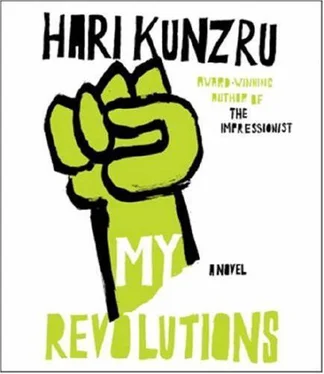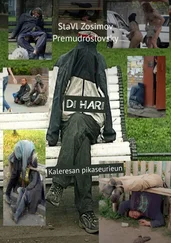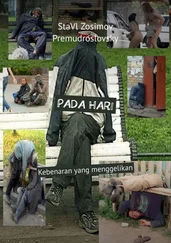splashed the story that a bomb had blown up part of the employ-
ment secretary’s constituency home. A communiqué had been
received from the bombers, which hadn’t been reproduced.
“Was that us?” I asked. Leo nodded.
“Anyone hurt?”
“No, not that it says.”
“Why wasn’t I told?”
He shrugged. “Because you’re a security risk,” he said flatly.
At last, to my face. I tried to make a joke of it. “What are you
going to do, Leo, put me on trial? A people’s court? March me into
the woods and shoot me in the back of the head?”
I wanted him to laugh. He didn’t laugh. He told me to use his
other name. Paul. I was to call him Paul Collins.
“Since when,” I asked, “are we bombing people’s houses? Did
we know nobody was in there?”
“A risk assessment was made.”
“A risk assessment was made. You know what’s going to happen,
don’t you, Leo? Someone’s going to get killed.”
Again he shrugged, the same petulant, noncommittal shrug.
“Collateral damage,” he said. “It’s inevitable in war.”
“You sound like General Westmoreland.”
“What do you mean by that?”
“Callous, Leo. You sound callous.”
“Human being or pig. You make your choice.”
“So there’s nothing in between?”
“No.”
“And the pigs have to die?”
He didn’t reply, just stared at me angrily.
I gave him a slow round of applause. “Well, good for you, mate.
That’s the kind of commitment I like.”
He chose to ignore my sarcasm. “Sean’s coming later. You can
have it out with him.”
Soon enough came the death-rattle buzz of the doorbell. Sean
wore a new gray suit and a hungry look. He was carrying, of all things, a leather attaché case, the kind with a combination lock and fancy metal clasps. He loped into the flat and filled the living room with misdirected energy. “Hello, Mike,” he said.
I laughed involuntarily. I couldn’t get used to the name. “Christ, Sean, there’s no one but us here.”
“Dennis Kilfoyle,” he said sharply. “Dennis.” The case dangled awkwardly from his arm. It was the oddest thing for him to carry. Its effect was to render the rest of the disguise theatrical; the suit, the club tie, the badly shaved chin.
He walked past me into the bedroom, picking his way over the mess. As we had no table, we’d taken to eating our meals standing at the kitchen counter or sprawled on the living-room carpet, which was now pocked with stains and cigarette burns. I asked Sean if he wanted to go out and eat.
“No time,” he said. “I’m here to drive you all to a meeting.”
I took this in. “When?”
“Tonight. Now. You should get some things together.”
I found a sports bag and started stuffing dirty clothes into it. Sean lit a cigarette, turned over one of the books lying on the floor. The sky was a black square in the curtainless window.
“So, how have things been?” I asked.
“We’re making progress.”
I waited for more. The silence spooled out like thread.
“You ready?” he asked eventually. I nodded. He was all business, ostentatiously checking his watch. Sean Ward, wearing a watch. We walked through the piss stink of the lobby and into the nighttime drizzle. Outside Arkwright House was parked a brand new Mercedes. He motioned me to get in.
“You’re going up in the world,” I noted.
“It’s a company car.”
All four of us broke into nervous laughter.
Sean drove out of the city, heading into the Peak District. It was drizzling and he was driving fast, too fast, as it turned out, for the traffic police. Flashing blue lights appeared in the rear window.
Under his breath, Sean swore, shifting around in his seat and loos-
ening his jacket.
“Here,” he said. “Take this.” He handed me a gun.
“What the fuck, Sean?”
“Dennis. It’s fucking Dennis. If he asks me to get out of the car,
you do him. Understand?”
I turned round. In the back, the other two were also readying
weapons. Leo seemed to have one of the machine pistols.
“I’m going to pull over, OK? Everyone set?”
Oh, fuck, I thought. Fuck. Fuck. It seemed as if we sat there for
eternity, hazard lights flashing, waiting for the tap on the
window.
“Hello, sir? Could I see your driver’s license and the car’s log
book, please?”
He was young, a clean pink face peering into the car, shiny with
rainwater. He shined a flashlight over our faces.
“Sorry, Officer, I don’t have them on me.”
“Your car, is it, sir?”
Stupidity. I tried to transmit it to the policeman by means of
telepathy. Just be stupid, if you’re not already. Be lazy.
Sean grinned. “Like the car?”
“Very nice. Three hundred, is it?”
“That’s right. Six point three liter.”
“Could you just tell me the registration number?”
Sean hesitated. Don’t make me shoot him, I thought. Please
don’t make me fucking shoot him. It was as if I could already feel
it, see it, the bloom of bone and blood, the bullet collapsing the
planes of the young policeman’s face. The silence was too long.
Sean was taking too long. Fuck. Fuck.
Then he reeled it off. “PWF 97K.”
The policeman hesitated. Leave it alone, I willed him. Go home
out of the rain.
“Thank you, sir,” he said, after a silence of infinite weight and
duration. “I’ll let you go now, but you’ll have to produce your docu-
ments at a police station within the next five days.” He wrote
something in his notebook. “And if you could just watch your speed, visibility’s not so good tonight. We don’t want any accidents.”
We pulled away and drove for a long time without speaking.
“Is this stolen?” asked Jay.
Sean nodded, fiddling with the radio. “It’s all right. I changed the plates.”
I exhaled. “And you memorized the new number.”
“What do you think I am? Some kind of cowboy? I’ll have the gun back now, if you don’t mind.”
We traveled through open countryside, listening to a stream of crackly pop songs that faded into static as we got up into the hills. The rain grew heavier, fat drops splashing on the windscreen. The headlights illuminated stone walls at the shoulder, rabbits scooting across the road. Finally Sean turned the Mercedes up a track that ran through a dense pine forest, coming to a halt in front of a rusty metal gate. I waited in the car as he ran to open it, holding his jacket over his head as an ineffectual shield against the water. We parked in front of an ugly gray stone building built, as far as I could see in the murk, around a little courtyard. The windows were covered with sheets of corrugated iron. Half the frontage was colonized by an enormous black ivy. It was a tumbledown place, the trees crowding in as if they were trying to reclaim it for the forest.
Soaked, Sean got back in, his hair plastered to his face. “Where are we?” I asked.
“Somewhere to keep you on the straight and narrow.”
He bared his teeth mirthlessly, pointing at a weathered wooden board nailed above the gate.
TOIL HARD FEAR GOD BE HONEST
Sometimes I dream about that old workhouse. Its interior was as stark as the granite façade. Most of the fittings had been ripped
out, leaving empty bathrooms whose skin of black and white tile was broken by the silhouettes of missing sinks and toilets, a foul-smelling workshop with painted-out windows and a raised proctor’s dais at one end. Our people had obviously been staying there for several days, sleeping on mats in a dusty dormitory that had a pile of iron bedsteads in one corner. They’d even rigged up a makeshift kitchen, with a low table of scavenged planks and a couple of rings running off bottled gas for cooking. Light came from oil lamps. A row of plastic buckets stood by a rainwater butt in the courtyard.
Читать дальше












